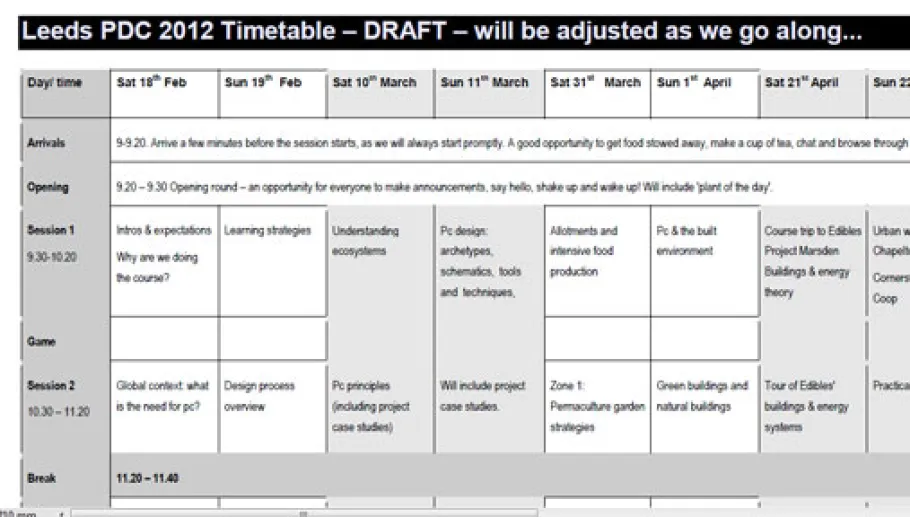
This is a course timetable for a PDc run in 2012 in Leeds by Andy Goldring. The course runs over 7 weekends, one weekend a month from February till June . Full timetable: Leeds_PDC_2012_timetable
A list of the things we will include in the sessions – really an indication of what we will be covering during the course. Some things will be very quick – an explanation of the terms and where to find out more, other topics will be in more depth. This will depend partly on the group. Introductions & expectations
- Introducing the course
- Why are we doing the course?
- Tutor intros
- Student intros
- Skills we want to learn
- Projects / properties / land we want to develop
- Tutor and student expectations
- Learning strategies
Permaculture overview
- Background and history
- Observation exercise
- Permaculture- ethics, principles, design and key characteristics
Permaculture in the UK
- Case-studies of current projects in the UK
Survey exercise
- Working with fixed points and grids
- Measuring own pace
- Making and using an A-frame and water level
- Making a base map
- Identify other survey methods (eg GPS) and tools (eg laser)
Weekend evaluation & notices
- Each weekend will end with an evaluation
- Different methods will be used to provide a range of methods for students to use in own projects.
Permaculture Principles
- Patterns in nature
- Input-output game
- Principles game will cover each principle and give examples
- Signposting key aspects of permaculture
- We will cover different sets of principles and how they were developed
Understanding ecosystems
- Key concepts: energy, food webs, biodiversity, etc and their relevance to permaculture
- Climatic zones
- Soil food web as key example
Permaculture Design
- Design process (OBRADIME, SADI)
- Patterns in Design
- Zoning
- Sectors
- Mcharg exclusion method
- Pattern Language
- Microclimates 1
- Involving people in design
- Thinking tools
Permaculture landscapes
- Focus on permaculture zones 3,4 & 5.
- Zoning game to include patterns of elements
- Water in the landscape
- Trees and windbreaks
- Biodiversity strategies
- Broadscale approaches to farming
- Introduce Keyline planning and holistic management
Permaculture and the built environment
- Focus on zone 0
- Buildings – new build and retrofit, eco homes, 'green' building and 'natural' building
- Transport
- Water, toilets, sewage
- Microclimates 2
- Design
- Passive solar case study: cornerstone bio-shelter
- Urban garden examples: urban harvest, skips, what if? guerilla etc
- Appropriate technology - key concepts and technologies
- House retrofit design case study
International permaculture
- Case studies: Jordan, El salvador, Malawi or Indonesia
- Scope of international network
- Drylands and tropical – examples and how to find out more
Social Permaculture
- Four generations model
- Community practical (movement)
- Ecovillages, coops, co-housing
- Organisational design case study
Permaculture economies
- Bioregions and design for local economies
- Credit unions and other economic strategies
- Who are we trading with?
- Cyclic clothing scheme in Leeds as example
- Legal structures, CSA
Permaculture Gardens
- Focus on zones 1 & 2
- Composting
- Plants and plant assemblies / guilds
- Polycultures, companion planting
- Integrated Pest Management, Dynamic accumulators etc
- Myco-tech (mushrooms)
- Allotment gardening
- Forest gardens
Practicals
- A series of afternoon sessions will be held
- We will try to cover as many different practical skills as possible, and use the practical sessions to bring the theory to life.
Urban Walkabout
- Visit to a variety of locations in Leeds:
- 29 Sholebroke Mount, Tim Harberd's, Methleys and Ecohomes
Mini design exercise
- Tutor led example in the field
- Student design work exercise in groups
Course Trip
- Cornerstone housing coop:
- Irrigation
- Rainwater harvesting
- Tour of garden
- House retrofit examples
- Sketch map mini design exercise
- Old Slenningford Forest Garden and other projects
Project planning
- What sort of project are you planning?
- Site selection and tips (contamination etc)
- Accessing land and buying land -tenure (Land of Roots case study, Ecological Land Cooperative)
- Project planning guidelines
Group Design Exercise
- All students will work in groups over two weekends to develop a permaculture design.
- Presentations are made on the last day
Where next?
- Diploma in Applied Permaculture Design
- Identifying own goals, projects and next steps
- Network – local and national
- Signposting other support and opportunities
Course evaluation
- A mixture of tutor designed evaluation process and student's own evaluation methods
Phew!
- Log in to post comments
